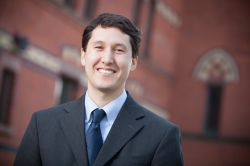Decisions, Ethics, and Human Potential
PROVO, Utah – Aug 31, 2020 – Every day, people make dozens of morally relevant decisions—often without even realizing it. Whether choosing how to spend their time, whom to help (and how much), or simply how to react to a difficult coworker, their daily decisions influence the kind of person they ultimately become. Isaac Smith designs his research to better understand how to help people refine their character. As a BYU Marriott School of Business assistant professor of organizational behavior and human resources, Smith hopes his research will help unlock the power of human potential and encourage people to become their best moral selves.
Some organizations try to fix ethical problems by merely posting lists of values on company websites or conducting one-off ethical trainings, but Smith’s research acknowledges that many ethical failures happen not because people had the wrong values or lacked the right ethical frameworks but simply because good people often fail to live up to their own moral values.
“People are often overconfident in their ability to make moral decisions,” he says. “We often rationalize and justify unethical behavior in a way that allows us to still feel good about ourselves. It’s a type of self-deception.” Smith’s research focuses on helping people live by their own moral principles and otherwise fulfill their potential.
Smith sees a strong link between his research and gospel principles. “All people have a conscience and the light of Christ within them,” he says. “As a Latter-day Saint, I believe all of us can tap into that light of Christ to help us make better decisions. From an academic perspective, scholars have found that most people have an innate desire to see themselves as good, moral individuals. Some of my research focuses on how to tap into—and help people live up to—that desire.”
Smith’s interest in human potential began as a desire to alleviate poverty. During his two-year mission for The Church of Jesus Christ of Latter-day Saints, Smith lived among and served the people of Mongolia, many of whom suffered from extreme poverty. “Every day I would see these people I loved suffering from the effects of poverty,” he says. “Seeing people deal with these problems firsthand changed my perspective in a deep and personal way. When I finished my service, I came home wanting to devote my future career to help eradicate poverty and suffering.”
His interest in alleviating poverty continued to grow as he earned undergraduate degrees in economics and English from BYU in 2004. Then, believing that the resources and knowledge base found in the business world could provide many opportunities to make a positive difference in the world, he went back to business school, earning his MBA from BYU Marriott in 2007.
As an MBA student, Smith used knowledge that he had gained at BYU Marriott when he took a trip to Thailand with a small team of classmates. “A huge tsunami had devastated Thai villages and destroyed their fishing boats. As business students, we conducted a feasibility study to see whether we could transition a new donor-funded boatyard into sustainable businesses that could employ boatbuilders in Thailand long-term,” he says. “Ultimately, we discovered that donors had flooded the market with too many free boats, killing any short-term opportunity for a profitable boatbuilding business.” Although the final result of the project was disappointing, it reaffirmed to the student team how important rigorous research and analysis are to humanitarian efforts.
As Smith continued conducting research, his focus on business solutions for poverty expanded to include a psychology-based approach of looking at individuals and their ethical decisions. “I’m interested both in how to help people work their way out of poverty and how to motivate people to become their best moral selves,” he says.
After earning his PhD in organizational behavior from the University of Utah, Smith continued this research for five years as a faculty member at Cornell University in Ithaca, New York. He enjoyed his work with the MBA program there, but he couldn’t resist the opportunity to return to BYU and BYU Marriott, his alma mater. “I’ve told many people that this position at BYU is probably the only position that I would have left Cornell for,” he says.
Since returning to BYU, Smith has enjoyed opportunities to get to know his students and have meaningful discussions about different aspects of their lives. “Teaching at BYU Marriott has been amazing because I’ve already been able to build strong relationships with many students in the one semester that I’ve taught here so far,” he says. “I love being able to connect with students on a spiritual level, in addition to just talking about coursework.”
In the classroom, Smith’s insights on inspiration and potential also affect the lives of his students. “So many organizational behavior concepts such as motivation, leadership, and values can be applied to students’ personal lives,” he says. “I love seeing the light go on in their eyes when students realize that these business concepts can be applied to their lives in meaningful ways.”
As students leave the classroom and pursue careers, Smith hopes they will use the tools they’ve gained in his class to make an impact on the people in their sphere of influence. “Anyone who wants to be a manager or a leader can utilize the tools from this class to help them fulfill their own potential,” he says. “But just as importantly, our students will be in a position to use these concepts to help other people fulfill their potential as well.”
Media Contact: Chad Little (801) 422-1512
Writer: Kenna Pierce






